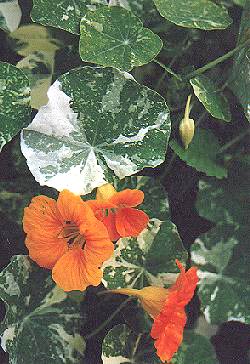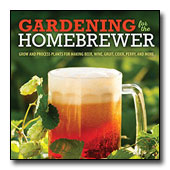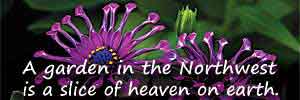Tropaeolum majus 'Alaska'
NASTURTIUM
Family: Tropaeolaceaez
Pronounced: troe-pay-OH-lum MAY-jus
Quick Jumps
Growing Guide
Rainy Side Notes
GROWING GUIDE

Origin:
Garden.
Plant Group:
Annual.
Hardiness:
Sunset zones: All.
USDA zones:: All.
Mature size:
Height: 12 inches (30 cm).
Width: 18 inches (45 cm).
Flowering period:
Summer until frost.
Flowering attributes:
Cream, deep red, yellow and orange single flowers.
Leaf attributes:
Green leaves with splashes of cream markings.
Growth habit:
Mound.
Light:
Full sun.
Soil:
Moist, well-drained soil. Nitrogen rich soil will produce more foliage that hides the flowers.
Feeding:
None required.
Propagation Methods:
Sow seed in situ in early May. Germinates in 7-14 days at 65°F (18°C).
Pests and Diseases:
Black aphids can be a problem with nasturtiums.
Rainy Side Notes
The botanist Linnaeus named the plants after the Greek word, tropaion, which means trophy. At one time, a trophy was a tree where the victors fixed the shields and helmets of their defeated enemies. When Linnaeus saw a nasturtium, growing on a post, it reminded him of the trophy image. The leaves looked like shields and the flowers like a helmet.
Tropaeolum majus 'Alaska' has handsome, variegated foliage on compact, non-trailing plants. They look great in the vegetable, herb or ornamental garden. Nasturtium leaves, flowers and seeds are edible and add a peppery taste to salads and vinegars. In addition, they are high in vitamin C and iron. The flowers make an attractive garnish.
Treat the plant as a vegetable if used for food and do not spray pesticides not labeled for edibles. Since I have an organic garden, I grow them wherever whim takes me and harvest what I want from any plant in the garden. It reseeds itself around my Northwest garden and comes true from seed. However, it is not weedy.
Nasturtiums attract hummingbirds and bees. Some gardeners use nasturtiums in the vegetable garden as a trap crop for black aphids.
Debbie Teashon
Photographed in author's garden.

Gardening for the Homebrewer: Grow and Process Plants for Making Beer, Wine, Gruit, Cider, Perry, and More
By co-authors Debbie Teashon (Rainy Side Gardeners) and Wendy Tweton
Copyright Notice | Home | Search | Annuals

